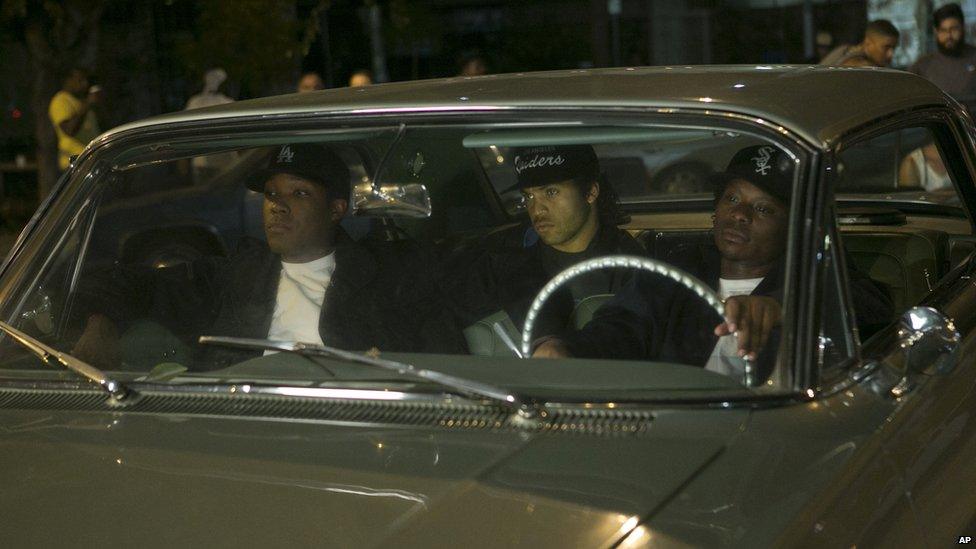Straight Outta Compton charts early days of NWA
- Published
Ice Cube: 'O'Shea had to earn the role'
Rap biopic Straight Outta Compton has spent two weeks at the top of the US box office, not bad for a film about a band who were once considered so dangerous they came under the spotlight of the FBI.
Straight Outta Compton recounts the story of the early days of NWA, a group of rappers and producers who came out of the economic urban blight of the LA neighbourhood of Compton in the late 1980s.
Unemployment, drugs, gangs and violence were rife in the world in which Ice Cube, Dr Dre, Easy-E, MC Ren and DJ Yella grew up.
Their debut album, filled with swaggering braggadocio and searing tales of teenage anger and resentment, not to mention one particular expletive-ridden track which still offends some American law enforcement officers to this day, is now viewed as a pioneering example of West Coast rap music.
Thirty years after it was recorded, the movie named after the album has found a huge audience, earning $60m (£39m) in its first week of release in the US and spending two weeks at the top of the box office.
Ice Cube, real name O'Shea Jackson, says it's all come as a bit of a surprise.
"You can never be that cocky, where you say, 'We're going to be number one'," says the now 46-year-old.
"To me the threshold was 'if we get past $30m' I'd be happy. But to open up to a $60m weekend is just beyond my wildest dreams."
The film has been met with largely positive reviews, external, though it has been accused of glossing over some of the more distasteful events in the group's past.
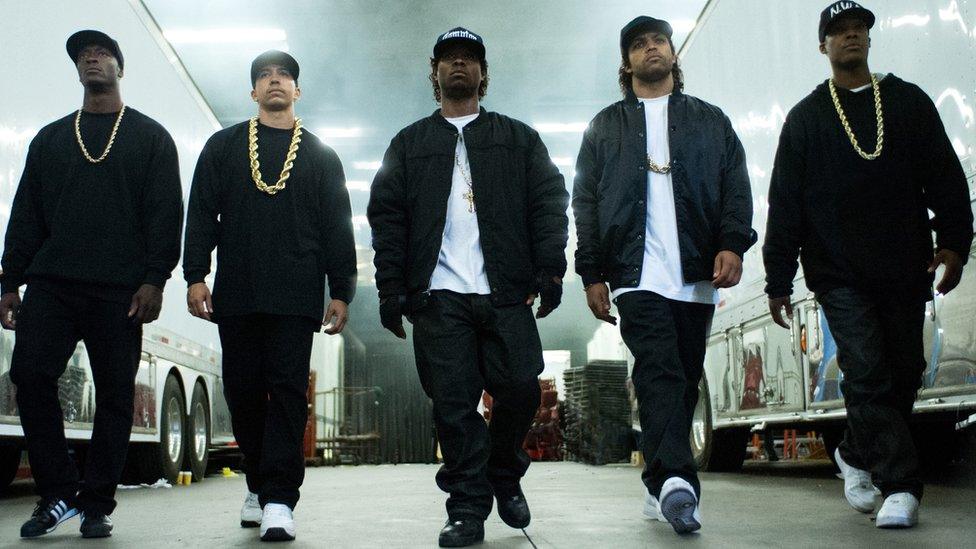
Left to right MC Ren (Aldis Hodge), DJ Yella (Neil Brown Jr), Easy-E (Jason Mitchell), Ice Cube (O'Shea Jackson Jr) and Dr Dre (Corey Hawkins)
Allegations of misogyny, homophobia and violence against women have all been swept aside in favour of a narrative arc which aspires more towards inspiration rather than self-reflection.
It's a tale of good guys and bad guys, with NWA portrayed as the flawed heroes and the media, the authorities, opportunistic manager Jerry Heller and record label boss Suge Knight all fulfilling the opposite roles.
Not altogether unsurprising, given the film has been produced by Ice Cube and Dr Dre - who, amid the blaze of publicity surrounding the film has formally apologised to the women he has " hurt" over the years - including a female journalist he was convicted of assaulting.
"I deeply regret what I did and know that it has forever impacted all of our lives," he told Rolling Stone magazine.
Much interest has also centred on the actor selected to play the teenage Ice Cube - Jackson's own 24-year-old son O'Shea Jr. Jr sports an 80s jheri curl haircut and Cube's signature scowl in the movie.
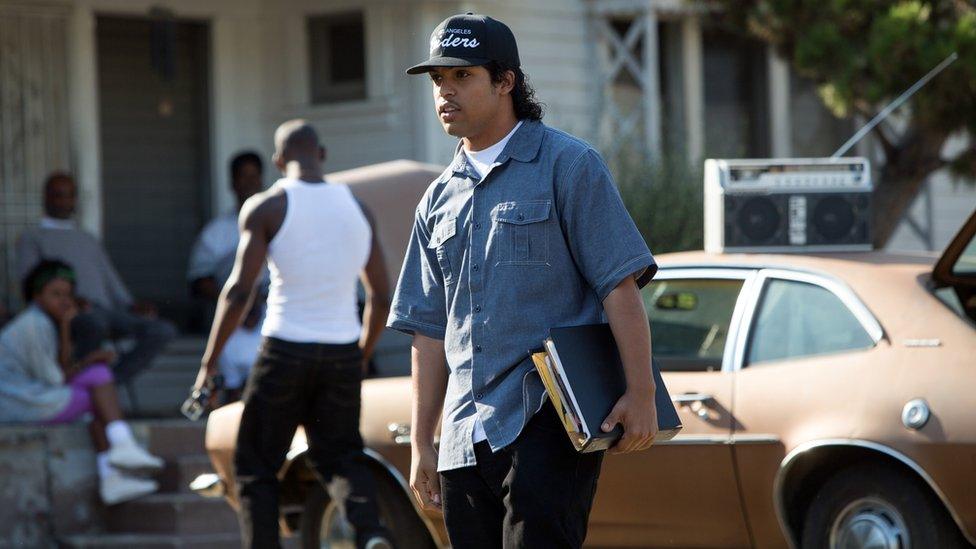
O'Shea Jackson Jr's astounding physical likeness to his father has been noted by critics
"I know him inside and out," insists Jackson Jr. "A lot of people have the scowl but I feel i have a better understanding of what's behind the scowl than most.
"There was two years of auditioning before I got the role and I couldn't be happier."
His father agrees: "I wanted him to earn it. I wasn't going to just give it to him, he had to earn it. That way, I knew his performance, his commitment was up to par."
Another pivotal role in the film is that of the group's founding member Eric "Easy-E" Wright.
A former hustler and drug dealer, he put up the money to record the debut album and it was his company Ruthless Records which managed the band.
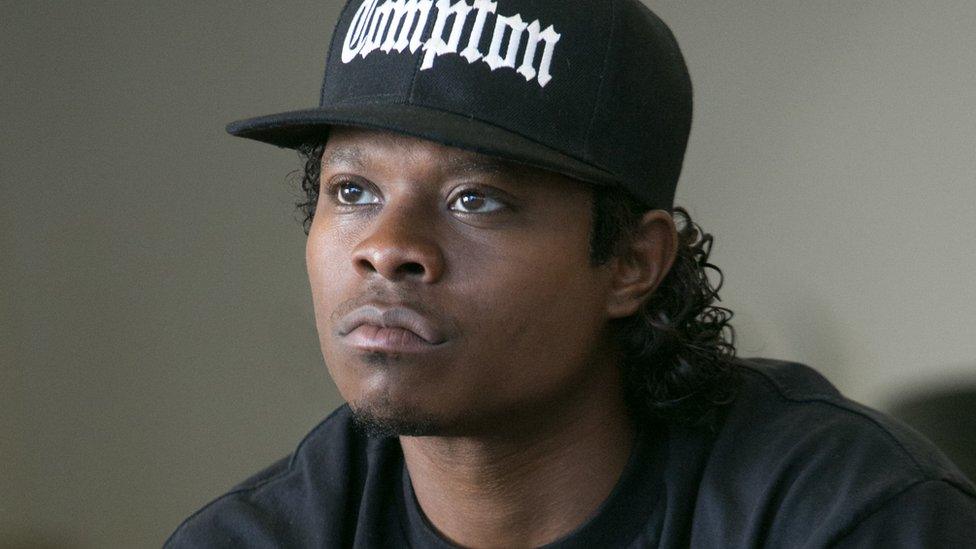
Easy-E goes from hustler to rapper to Aids victim over the course of the film
In 1995, he died aged 31 from Aids and is played in the film by New Orleans actor Jason Mitchell.
"It's a huge misconception about Easy that he was just a ruthless character, that he was just this drug dealer who got lucky.
"He was a huge personality and he was a marketing genius. A lot of those things that were in his own personality he put out to the world and made money because he knew what people wanted to see. But he really cared about his brothers and that's what this film is about - brotherhood.
"It was what Eric Wright felt, not Easy-E as everybody knows him."
The album, on which the film is based, was released in 1988, almost 30 years ago. The area of Compton may be different now thanks to a huge amount of urban regeneration but its themes remain as relevant as ever, a year on from the police shooting of a black teenager in Ferguson, Missouri, and a recent a number of high-profile shootings of unarmed black men in US cities.
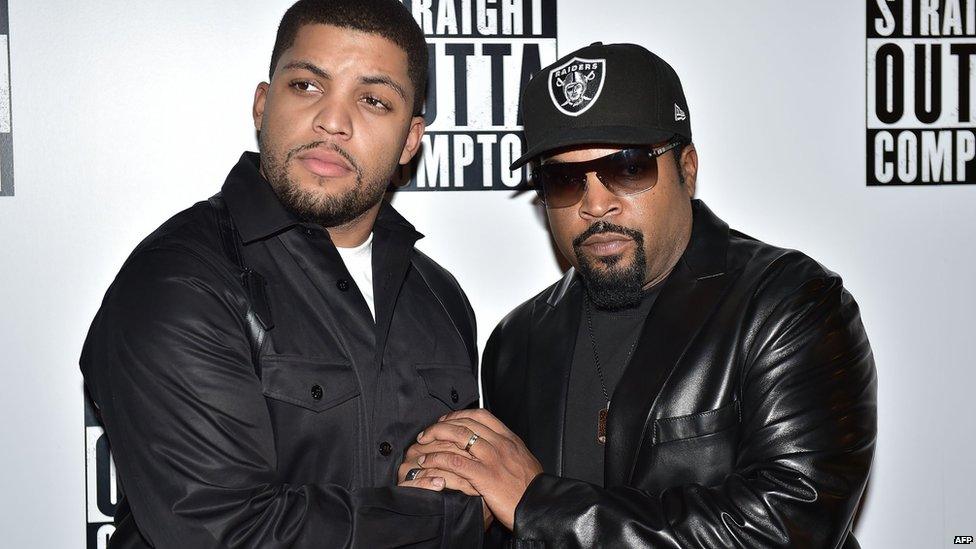
Cube (right) says the album was "honest" adding, "the songs are a snapshot of life how we were experiencing it"
"I think it's honest," says Ice Cube. "The record was raw, the songs are a snapshot of life how we were experiencing it in the late 80s and people can feel that and can understand, coming from a rough neighbourhood going through rough things but trying to come out on top.
"Its an underdog story that I think everybody respects because everybody feels like they're an underdog to some extent. Especially with songs like F-the police, a lot of people want to speak their frustrations, the song can be their weapon, rather than a real weapon.
So, a lot of people were feeling what we were going through and could just identify with it."
Straight Outta Compton is in UK cinemas now.
- Published17 August 2015
